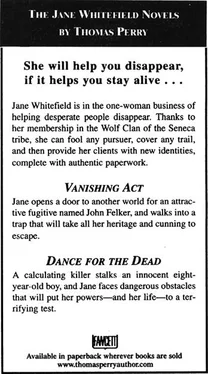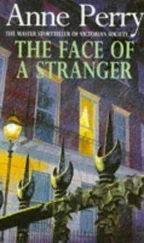He stuck the pistol into his coat pocket and began to crawl along the peak of the roof. He said to himself that he was too old to be this stupid, or maybe too stupid to have grown this old. He had come into Santa Barbara alone because he had wanted to get the woman’s cooperation. He had gotten her cooperation, all right. And that was only after he had emptied his sidearm punching holes in shadows from fifty yards. Now he was going to do something else that was even more stupid.
He had nearly reached the edge of the roof. He raised his head a little to verify what he had remembered about the height of the building. He rose unsteadily to his feet, straddling the peak of the roof. He took two steps forward, then the third right on the bent shingles at the crest, then the fourth, fifth, and launched himself into the air.
He had guessed that the peak was high enough above the flat top of the building beside it to make up for the fact that he couldn’t get a running start on a sloped roof. As he began his fall, he was not certain that he had been right. But after a second his optimism returned. He braced himself for the landing, tried to break his fall, but felt the impact from his ankles, up his spine, to his shoulders. He rolled, pulled the pistol out of his belt, and brought it up.
One of the two men was lying on the next roof with his arm extended toward Marshall. But Marshall was in the same position, the gift pistol’s single-dot sight already settling on the man’s head. Marshall squeezed the trigger and the man jerked once, then lay still.
Marshall ran forward and jumped to the roof where the man lay. He saw the second man run across the next roof, then leap to the one with the ladder. Marshall heard the sound of running feet in the alley below … police? He heard a voice shout, “This way.”
He ran to the edge of the building and looked down into the alley. There was a third man waving at the man on the roof. He had stayed on the ground, and must have been working his way along the row of buildings, waiting for a shot at Marshall or the woman. But now he was a hundred yards ahead of the other man, and he was going after her. Marshall knew that the man who had been retreating toward the ladder would reach it in a few seconds, and the shot at him was the more likely of the two, but this one was close enough behind the woman to have a chance of catching her.
Marshall turned his body away from the man on the roof to bring his right arm beyond the edge below his feet, and straighten it. As he looked down into the alley, the gift pistol in his hand was already part of his field of vision. He brought the single white dot between the two dots of the rear sight, let it settle on the top of the running man’s head, and squeezed the trigger.
The man’s left leg was striding forward, but when the foot hit the ground there was no life in it, and it didn’t hold his weight. From above, it looked to Marshall as though he were suddenly ducking to run downward into the ground.
Marshall pivoted and dashed for the gap between the buildings. He landed on the next roof still running, then leapt to the last one. When he reached the ladder, the alley seemed to explode into glaring white light. He involuntarily flinched and turned his head to shield his eyes. Across the roof he could see that the fronts of the buildings along the far side of the street were lit up by the colored warning lights of police cars, flashing, then sweeping across the facades, then flashing again. Doors slammed, hard rubber shoes pattered up the alley below him.
Marshall stood above the ladder and raised his hands high, so the men below could see him clearly. He shouted loudly, so they would hear. “F.B.I. Special Agent John Marshall,” he called. That seemed to satisfy the policemen below him, for the moment. None of them seemed inclined to shoot.
A couple of them looked away from him at the three policemen who were bent over the man he had shot from above. “That’s not all of them,” Marshall called down.
“How many? What description?”
He hesitated for a half second, then pointed away from the direction the woman had run. “One male. Armed. He took off that way on foot.”
Jane made her way back along the quiet, empty streets, listening. There were distant sirens, but the sky a few blocks south of her was already bright with the lights of police cars blinking garish colors into the foggy night air. She supposed the sirens were the reinforcements.
Jane moved along the street behind Brian Vaughn’s house, winded, sore, and dazed. She knew that the only sensible thing to do was to get into her car and try to make it out of Santa Barbara now, but she had been drawn here. She could not let all that had happened come to nothing. She had to salvage one piece of evidence that something had occurred tonight besides three unidentified shooters trying to kill an F.B.I. agent.
Jane cautiously stole up the driveway and into the back yard of the house behind Brian Vaughn’s. She moved to the fence and pulled herself over it. The lights in the house were still on, and the kitchen door was ajar, as though everyone had dashed outside to escape a fire that had unaccountably gone out.
She saw the video camera lying where she had dropped it behind the garbage cans when she had run to the house. She picked it up and looked at the little window. The tape was still in it. The intercom was a foot or two away, so she picked it up, too.
Over the soft hissing of the intercom came the sound of footsteps. She listened. Somebody was still in the house. She took a step closer to the back door, and her head came forward to bring her body into a crouch.
She heard the steps moving quickly now, almost a run. Then she heard the front door slam. She dropped the camera and the intercom at her feet and sprinted along the side of the house on the driveway.
Just as she reached the corner of the house, a man crossed the sidewalk, stepped to the curb, and reached for the door handle of Brian Vaughn’s little red Miata. His fingers closed on it, the door swung open, and the dome light came on.
Jane saw the face and drew in a breath: she knew it. It was not the face of the man she had seen in Vaughn’s doorway, or of either of the men she had seen when she was with Richard Dahlman. It would not even have surprised her if the man she had electrocuted in L.A. had merely been stunned and lived to drive up here for the pleasure of seeing her die. This was the face of a genuine ghost.
The man got into the car, started the engine, then suddenly turned his head in Jane’s direction. She stepped back into the shelter of the house, but it was too late. The ghost had seen her too.
She hurried back up the driveway, staying in the shadows close to the clapboards of the house, where he would have a hard time getting a clear shot at her. But in a moment she heard the car accelerate up the street and away.
Marshall stood outside in the midday sunshine while the forensics team completed the search of the house where Charles Langer had died. He had watched them from the doorway for a long time, moving slowly and methodically outward from the body, and by now they would be close to the perimeter. He had seen this process too many times. Hours and hours ago, while he had stood in the alley answering questions, he had watched them searching the ground and the roofs, marking each spot where a brass casing had been ejected from a gun, drawing diagrams and taking pictures, and he’d had time to evaluate their competence. They didn’t need his advice on how to handle this house.
He heard an engine, and watched without interest as another unmarked police car pulled up and two men in sport coats got out. The older one with thinning blond hair walked up the sidewalk and stopped in front of him. “Are you Special Agent Marshall?”
Читать дальше












